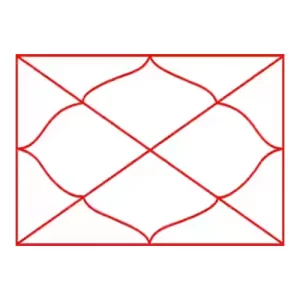Description
Harmony and Balance
Vastu aims to create harmony and balance between the natural elements and the built environment. By aligning structures with the natural forces of the earth, air, water, fire, and space, Vastu promotes a sense of equilibrium and well-being.
Positive Energy Flow
Vastu principles are designed to facilitate the flow of positive energy, or "prana," throughout the living or working space. Proper orientation, layout, and placement of rooms, furniture, and objects help to channelize this energy, creating a conducive environment for health, happiness, and prosperity.
Enhanced Health and Well-being
Vastu-compliant spaces are believed to support physical, mental, and emotional well-being. By optimizing factors such as sunlight, ventilation, and natural elements, Vastu contributes to a healthier living environment, reducing stress and promoting overall wellness.
Improved Relationships
Vastu emphasizes the importance of harmonious relationships within the household or workplace. By creating spaces that foster communication, understanding, and mutual respect, Vastu can help strengthen family bonds and promote collaboration and teamwork in professional settings.
Financial Prosperity
Vastu principles are believed to influence financial prosperity and abundance. By optimizing the energy flow within the space and aligning it with the principles of abundance, Vastu can attract wealth and prosperity into the lives of its inhabitants.
Career Growth and Success
Vastu-compliant workplaces are conducive to productivity, creativity, and career advancement. Proper placement of workstations, offices, and meeting rooms can enhance concentration, focus, and professional growth, leading to greater success and fulfillment in one's career.
Enhanced Quality of Life
Overall, the benefits of Vastu contribute to an improved quality of life for its practitioners. By creating environments that support physical, emotional, and spiritual well-being, Vastu helps individuals and families lead happier, healthier, and more fulfilling lives.
Peaceful Living Environment
Vastu promotes a sense of tranquility and peace within the living or working space. By minimizing disruptions and disturbances in the environment, Vastu fosters a peaceful atmosphere conducive to relaxation, meditation, and spiritual growth.
Environmental Sustainability
Vastu principles often emphasize sustainable and eco-friendly design practices, such as maximizing natural light and ventilation, conserving energy and water, and using environmentally friendly materials. By promoting sustainability, Vastu contributes to the preservation of the environment for future generations.
Vastu Shastra is an ancient Indian architectural science that governs the design, layout, and orientation of buildings to create harmonious living and working environments. It is based on the principles of balancing the five elements of nature – earth, water, fire, air, and space – within the built environment to promote health, prosperity, and well-being.
Detailed Answer: Vastu Shastra, often referred to simply as Vastu, is a traditional Hindu system of architecture that dates back thousands of years. It encompasses a set of guidelines and principles derived from ancient texts and scriptures, such as the Vedas and the Puranas, which govern the design and construction of buildings. Vastu aims to create spaces that are in harmony with the natural elements and energies of the universe, thereby enhancing the quality of life for its inhabitants. It considers various factors, including the direction, layout, proportions, and placement of rooms, doors, windows, and other architectural elements, to optimize the flow of energy and create a conducive environment for physical, mental, and spiritual well-being.
The key principles of Vastu Shastra include directional alignment, balance of the five elements, symmetry, proportion, and placement of rooms and objects within the building.
Detailed Answer: Vastu Shastra is based on several fundamental principles that govern the design and layout of buildings. These include directional alignment, which involves positioning the building in harmony with the cardinal directions (north, south, east, west) and the cosmic energies associated with each direction. The balance of the five elements – earth, water, fire, air, and space – is another important principle, with each element represented by specific materials, colors, and shapes used in construction. Symmetry and proportion play crucial roles in Vastu, with buildings designed to be symmetrical and proportionate to create a sense of balance and harmony. Additionally, the placement of rooms, doors, windows, and other architectural elements within the building is carefully considered to optimize the flow of energy and create a conducive environment for its inhabitants.
Following Vastu principles can lead to numerous benefits, including improved health, prosperity, relationships, and overall well-being.
Detailed Answer: The benefits of following Vastu principles are manifold. By aligning buildings with the natural elements and energies of the universe, Vastu promotes a sense of harmony and balance within the living or working environment. This, in turn, can lead to improved physical health, mental clarity, and emotional well-being for the inhabitants. Vastu-compliant spaces are believed to attract positive energy and abundance, fostering prosperity and success in various aspects of life. Additionally, Vastu principles emphasize the importance of harmonious relationships and communication within the household or workplace, leading to stronger bonds and greater cooperation among family members or colleagues. Overall, following Vastu principles can contribute to a more harmonious, prosperous, and fulfilling life for its practitioners.
Yes, Vastu Shastra can be applied to existing buildings through remedial measures and modifications to align the space with Vastu principles.
Detailed Answer: While it is ideal to incorporate Vastu principles during the design and construction phase of a building, Vastu can also be applied to existing structures through remedial measures and modifications. These may include rearranging furniture, changing the color scheme, adding mirrors or plants, adjusting the placement of doors and windows, and performing specific rituals or remedies to balance the energies within the space. While the extent of modifications may vary depending on the specific Vastu defects present in the building, even small changes can have a significant impact on the energy flow and overall harmony within the space. By consulting with a Vastu expert or practitioner, individuals can identify areas of imbalance and implement appropriate remedies to bring their space into alignment with Vastu principles.
The primary elements of Vastu Shastra include the five elements of nature – earth, water, fire, air, and space – as well as the directional alignments, energy grids, and architectural features that govern the design and layout of buildings.
Detailed Answer: Vastu Shastra is based on the interplay of various elements, energies, and principles that govern the design and construction of buildings. The primary elements of Vastu include:
- Earth: Represents stability, support, and grounding. The choice of building materials and the foundation of the structure are influenced by the earth element.
- Water: Symbolizes purity, vitality, and abundance. The placement of water bodies such as wells, tanks, and ponds is considered in Vastu to harness the positive energies of water.
- Fire: Signifies energy, transformation, and illumination. The location of the kitchen, fireplace, and electrical appliances is determined by the fire element in Vastu.
- Air: Represents movement, circulation, and breath. Proper ventilation and airflow within the building are essential for maintaining a healthy and vibrant living environment.
- Space: Represents openness, expansiveness, and potentiality. The layout and design of rooms, corridors, and open spaces are influenced by the space element in Vastu.
Additionally, Vastu takes into account directional alignments, energy grids (vastu purusha mandala), and architectural features such as entrances (gates), windows (jharokhas), and sacred spaces (pooja rooms) to create harmonious and auspicious environments.
Vastu Shastra influences the layout of a home by determining the placement of rooms, entrances, windows, and architectural features to optimize the flow of energy and create a harmonious living environment.
Detailed Answer: Vastu Shastra provides guidelines for the layout and design of a home to ensure that it is in harmony with the natural elements and energies of the universe. The layout of a home is influenced by factors such as directional alignments, energy grids, and architectural features, which are carefully considered to optimize the flow of energy and create a conducive living environment. For example, the main entrance of the home should ideally face a favorable direction (such as east or north) to allow positive energy to enter the space. The placement of rooms, such as the bedroom, kitchen, and living room, is determined based on their function and the energies associated with them. Windows and openings are strategically placed to allow for adequate ventilation and natural light while maintaining privacy and security. By following Vastu principles in the layout of a home, individuals can create spaces that promote health, happiness, and prosperity for themselves and their families.
Yes, Vastu Shastra can improve relationships within a household by creating a harmonious and supportive living environment that fosters communication, understanding, and mutual respect among family members.
Detailed Answer: Vastu Shastra emphasizes the importance of harmonious relationships and communication within the household. By creating a living environment that is in harmony with the natural elements and energies of the universe, Vastu can help improve relationships among family members. For example, the placement of rooms within the home, such as the bedrooms, living room, and dining area, can influence the dynamics of family interactions and communication. Vastu also considers factors such as colors, lighting, and furniture placement, which can affect the mood and atmosphere within the home. By optimizing these factors according to Vastu principles, individuals can create a supportive and nurturing environment that promotes understanding, empathy, and cooperation among family members. Additionally, Vastu remedies and rituals can be performed to enhance positive energies and mitigate any imbalances that may exist within the household, further strengthening relationships and fostering a sense of unity and harmony.
Yes, Vastu Shastra can be applied to commercial buildings and workplaces to create a conducive environment for productivity, creativity, and success.
Detailed Answer: Vastu Shastra principles can be applied to commercial buildings and workplaces to optimize the flow of energy and create a harmonious working environment. Factors such as the layout of the office, the placement of workstations, the direction of entrances, and the location of meeting rooms are carefully considered to promote productivity, creativity, and success. For example, the main entrance of the office should ideally face a favorable direction (such as east or north) to attract positive energy and opportunities. The placement of the boss's cabin, conference rooms, and common areas is determined based on their function and the energies associated with them. By following Vastu principles in the design and layout of the workplace, employers can create an environment that supports the well-being and performance of their employees, leading to greater efficiency, job satisfaction, and success for the organization as a whole.
Common Vastu remedies for homes and buildings include rearranging furniture, adding mirrors or plants, using specific colors and materials, performing rituals or poojas, and using Vastu Yantras or symbols.
Detailed Answer: Vastu remedies are used to mitigate imbalances or defects in the energy flow within a home or building. Some common Vastu remedies include:
- Rearranging furniture: Adjusting the placement of furniture to optimize the flow of energy and create a harmonious living environment.
- Adding mirrors or plants: Placing mirrors or indoor plants in strategic locations to enhance positive energy and mitigate negative influences.
- Using specific colors and materials: Using colors and materials that are associated with positive energies and vibrations according to Vastu principles.
- Performing rituals or poojas: Performing specific rituals or poojas to appease planetary energies or deities and bring blessings and protection to the home or building.
- Using Vastu Yantras or symbols: Installing Vastu Yantras or symbols, such as the Shri Yantra or Vastu Purusha Mandala, to amplify positive energies and counteract negative influences.
These remedies are often tailored to address specific Vastu defects or imbalances identified within the home or building and may vary depending on individual circumstances and preferences.
Vastu Shastra can influence financial prosperity by creating a harmonious and supportive environment that attracts wealth and abundance.
Detailed Answer: Vastu Shastra principles are believed to influence financial prosperity by optimizing the flow of energy within the home or workplace. By aligning buildings with the natural elements and energies of the universe, Vastu creates an environment that is conducive to attracting wealth and abundance. For example, the placement of the main entrance, the location of the kitchen, and the orientation of the workspace can all impact financial success according to Vastu principles. Additionally, specific Vastu remedies and rituals may be performed to enhance prosperity and mitigate any imbalances that may exist within the space. By following Vastu guidelines and implementing appropriate remedies, individuals can create an environment that supports their financial goals and aspirations, leading to greater prosperity and success in life.
Yes, Vastu Shastra can help in selecting a plot of land for construction by assessing its natural features, orientation, and surroundings to determine its suitability according to Vastu principles.
Detailed Answer: When selecting a plot of land for construction, Vastu Shastra principles can be used to assess various factors that may influence the energy and suitability of the site. These factors include the shape and topography of the land, the direction and slope of the terrain, the presence of natural features such as water bodies or trees, and the surrounding environment and infrastructure. According to Vastu guidelines, plots of land that are square or rectangular in shape, with even terrain and a gentle slope towards the north or east, are considered auspicious for construction. Additionally, the land should be free from any negative influences such as obstructions, water bodies, or graveyards in close proximity. By considering these factors and consulting with a Vastu expert, individuals can select a plot of land that is in harmony with the natural elements and energies of the universe, thereby laying the foundation for a successful and prosperous construction project.
Yes, Vastu Shastra can help in designing a garden or landscaping by optimizing the placement of plants, trees, pathways, water features, and other elements to create a harmonious and auspicious outdoor environment.
Detailed Answer: Vastu principles can be applied to garden design and landscaping to enhance the flow of positive energy and create a balanced and serene outdoor environment. According to Vastu guidelines, the layout and orientation of the garden should be in harmony with the cardinal directions, with the north and east sides of the garden considered auspicious for planting trees and flowers. The selection of plants and trees should also be based on their compatibility with the surrounding environment and their ability to attract positive energy. Additionally, the placement of pathways, water features, and seating areas should be carefully considered to create a sense of balance and harmony within the garden. By following Vastu principles in garden design and landscaping, individuals can create an outdoor space that promotes relaxation, rejuvenation, and well-being for themselves and their families.
Vastu Shastra plays a significant role in interior design by influencing the layout, color scheme, furniture placement, and decorative elements within a space to optimize the flow of energy and create a harmonious living environment.
Detailed Answer: Vastu Shastra principles can guide interior design decisions to ensure that the space is in harmony with the natural elements and energies of the universe. Factors such as the orientation of rooms, the placement of furniture, the selection of colors, and the use of decorative elements are all influenced by Vastu guidelines. For example, rooms such as the bedroom and living room should ideally be located in favorable directions, with furniture arranged to facilitate the flow of positive energy. Colors and materials used in interior design should be selected based on their association with specific elements and their ability to create a balanced and harmonious atmosphere. Additionally, decorative elements such as paintings, sculptures, and ornaments can be chosen to enhance the energy of the space and create a sense of tranquility and well-being. By following Vastu principles in interior design, individuals can create living spaces that promote health, happiness, and prosperity for themselves and their families.
Yes, Vastu Shastra can influence the health of the occupants of a building by creating a supportive and nurturing environment that promotes physical, mental, and emotional well-being.
Detailed Answer: Vastu Shastra principles are based on the concept of aligning the built environment with the natural elements and energies of the universe to create a harmonious living environment. By optimizing factors such as ventilation, sunlight, and the placement of rooms, Vastu can help create spaces that support the health and well-being of the occupants. For example, rooms such as the bedroom and kitchen should ideally be located in favorable directions to promote restful sleep and healthy eating habits. Adequate ventilation and natural light are essential for maintaining a healthy indoor environment, while the use of non-toxic materials and colors can contribute to a sense of well-being and vitality. Additionally, specific Vastu remedies and rituals may be performed to address any imbalances or negative influences that may affect the health of the occupants. By following Vastu principles in the design and construction of buildings, individuals can create spaces that promote health, happiness, and prosperity for themselves and their families.
Vastu Shastra can be applied to promote spiritual well-being by creating sacred spaces within the home or workplace, performing rituals or poojas, and incorporating spiritual symbols and imagery into the environment.
Detailed Answer: Vastu Shastra principles emphasize the importance of creating a supportive environment that nurtures spiritual growth and development. This can be achieved by incorporating sacred spaces such as pooja rooms or meditation areas into the design of the home or workplace. These spaces should be located in favorable directions and designed to evoke a sense of peace, tranquility, and reverence. Additionally, performing rituals or poojas within these spaces can help purify the energy of the environment and create a connection to the divine. Spiritual symbols and imagery, such as yantras, mandalas, and religious icons, can also be used to enhance the spiritual atmosphere of the space. By following Vastu principles and incorporating spiritual practices into their daily lives, individuals can create environments that support their spiritual well-being and deepen their connection to the higher self.
Yes, Vastu Shastra can be applied to rental properties or temporary spaces through simple modifications and remedies to optimize the flow of energy and create a harmonious living environment.
Detailed Answer: While it may be challenging to implement extensive Vastu changes in rental properties or temporary spaces, there are still ways to apply Vastu principles to create a supportive and nurturing environment. Simple modifications such as rearranging furniture, adding plants or mirrors, and using specific colors and materials can help optimize the flow of energy within the space. Additionally, performing Vastu rituals or remedies, such as lighting incense or chanting mantras, can help purify the energy of the environment and create a sense of harmony and well-being. While the extent of Vastu modifications may be limited in rental properties or temporary spaces, even small changes can have a significant impact on the energy and atmosphere within the space, leading to greater health, happiness, and prosperity for the occupants.
You can find a qualified Vastu consultant or practitioner through referrals from friends or family, online directories, professional associations, or by attending Vastu workshops and seminars.
Detailed Answer: When searching for a qualified Vastu consultant or practitioner, it's essential to do thorough research and consider several factors before making a decision. You can start by asking for referrals from friends, family, or colleagues who have experience working with Vastu consultants. Online directories and professional associations may also provide listings of certified Vastu practitioners in your area. Before hiring a consultant, be sure to check their credentials, qualifications, and experience in the field. You may also want to schedule an initial consultation to discuss your needs and goals and determine if the consultant is the right fit for you.














Reviews
There are no reviews yet